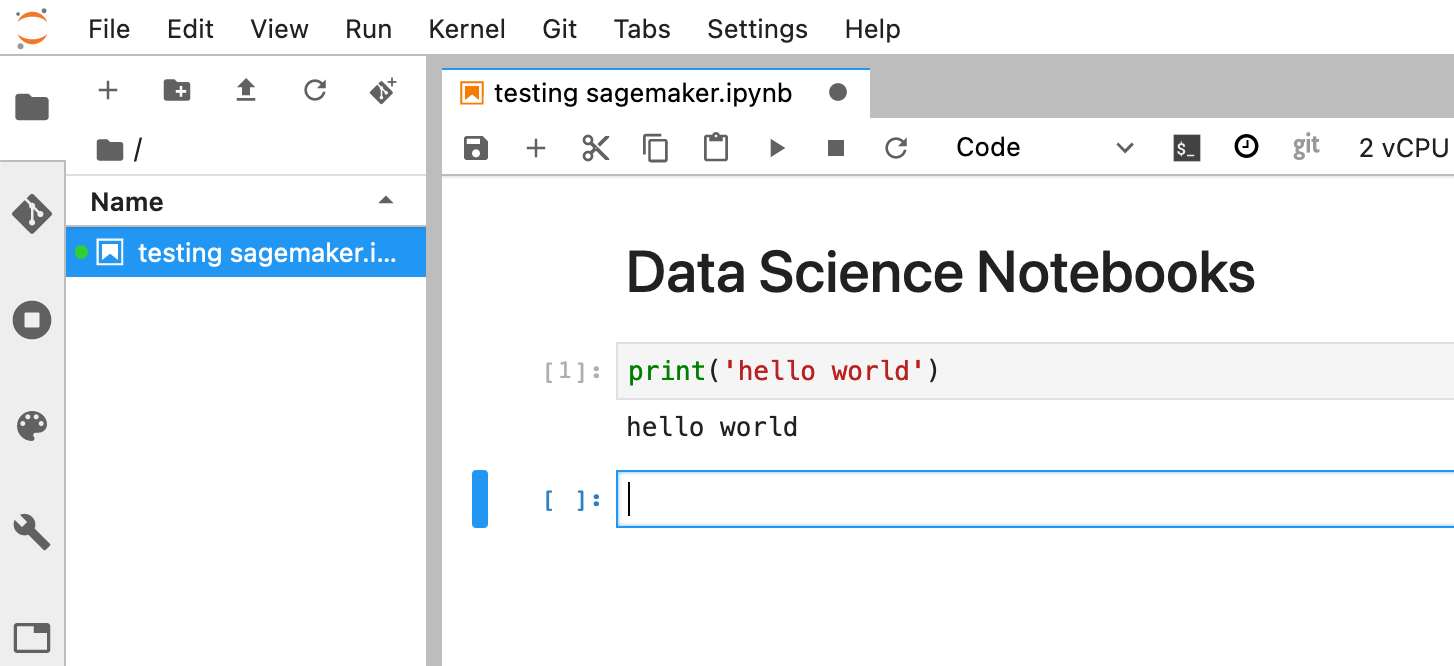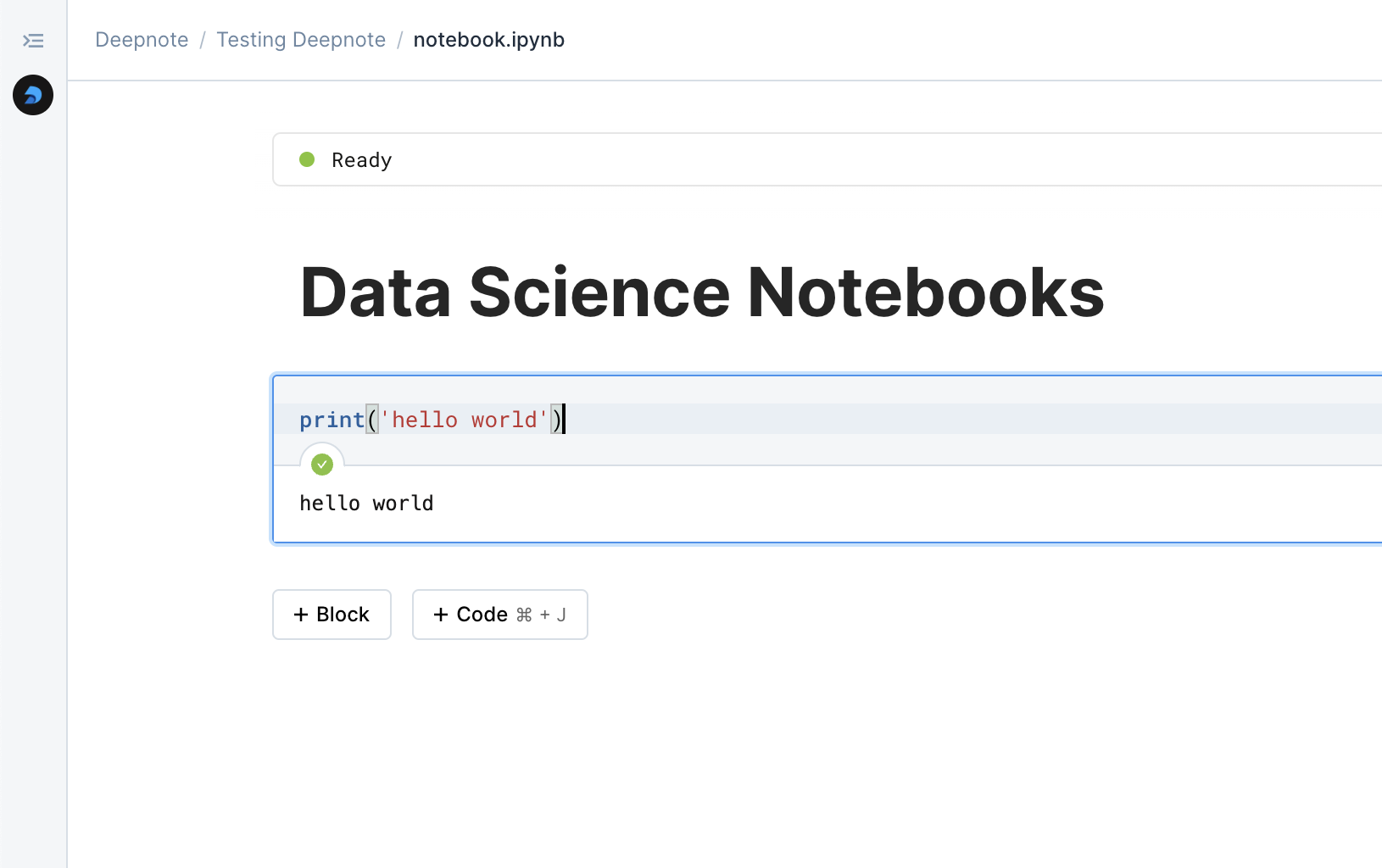

Amazon Sagemaker

Comparing two data science notebooks.






The landscape of data science tools is constantly evolving, and with various platforms available, choosing the right one can be daunting. Two prominent names in the field are Amazon SageMaker and Deepnote. Both offer robust capabilities but cater to different needs and workflows. This comparison will help you decide which platform is the best fit for your data science and machine learning projects.
Amazon SageMaker is a cloud-based machine learning (ML) platform that enables developers to create, train, and deploy ML models quickly. It integrates seamlessly with other AWS services, offering a comprehensive suite of tools for all stages of the ML lifecycle.
Deepnote is a collaboration-first data platform that provides a powerful, cloud-based workspace. It allows users to explore, collaborate on, and share data, create interactive charts and dashboards, and build and deploy ML models efficiently.
SageMaker is primarily designed as a machine learning platform, emphasizing model development, training, and deployment within the AWS ecosystem. It excels in providing scalable infrastructure for machine learning operations but requires significant AWS expertise to fully utilize its capabilities. The platform's strength lies in its robust ML tooling and integration with AWS services, though this comes with a steeper learning curve and more complex setup requirements.
Deepnote, in contrast, approaches data science from a collaboration and productivity perspective. It provides a comprehensive workspace where the notebook is one component of a larger, integrated environment. This includes built-in data source connections, SQL integration with visual schema exploration, automated scheduling, and sophisticated team collaboration features. While SageMaker focuses on ML operations, Deepnote emphasizes team productivity and accessibility, offering features like real-time collaboration, integrated version control, and advanced visualization tools with BI-like capabilities through data apps. The platform's design philosophy prioritizes immediate usability and team collaboration over infrastructure management.
SageMaker's AI capabilities primarily focus on model development and deployment. While it includes CodeWhisperer for code completion, its AI features are more oriented toward machine learning workflows rather than development assistance. The platform excels in providing tools for model training and deployment but lacks integrated AI assistance for day-to-day development tasks.
Deepnote takes a more comprehensive approach to AI integration. Its Autonomous AI assistant helps with code generation, debugging, and explanation. The platform's natural language capabilities extend to chart generation and data exploration, while Codeium integration provides advanced code completion. Recent updates have enhanced these features with improved context understanding and more sophisticated code suggestions.
SageMaker provides a robust environment for machine learning development, with strong support for various ML frameworks and scalable computing resources. However, its setup and configuration can be complex, requiring familiarity with AWS services and infrastructure management.
Deepnote offers a more streamlined development experience with instant setup and integrated tools. Its environment supports multiple programming languages and includes built-in features for data visualization, SQL querying, and collaborative development. The platform's design emphasizes immediate productivity without the need for complex configuration.
SageMaker's data integration capabilities are primarily focused on AWS services, offering seamless connectivity with Amazon S3, Redshift, and other AWS data sources. While powerful within the AWS ecosystem, connecting to external sources often requires additional setup.
Deepnote provides built-in integrations for various data sources, including major cloud platforms and databases. Its visual schema explorer and integrated SQL capabilities make data exploration more intuitive. Recent updates have expanded these capabilities with improved performance and additional connectors.
Amazon SageMaker supports various machine learning frameworks and provides a Jupyter-compatible environment. However, it doesn't offer enhanced AI code completion.
Deepnote supports Python, R, SQL, and custom environments for any programming language. Its AI code completion, powered by Codeium, helps users write code faster and more accurately, boosting productivity.
Amazon SageMaker supports SQL blocks in notebooks but lacks advanced interaction features.
Deepnote enhances data interaction with an in-app schema explorer for visual database comprehension. It supports SQL blocks with code completion and built-in data frame outputs, making it easier to work with and visualize data. Deepnote also offers native charting capabilities for building interactive dashboards.
Amazon SageMaker focuses more on model deployment rather than data publishing.
Deepnote excels in data publishing with its advanced reporting and dashboarding features through Deepnote Apps. Users can create and schedule reports, prepare public views, and offer interactive views with fine-grained permission settings.
SageMaker's collaboration features are limited, focusing more on model management and deployment workflows. Team collaboration typically requires additional AWS services and setup.
Deepnote excels in collaboration with built-in features for real-time co-editing, commenting, and version control. The platform's team-oriented design includes sophisticated permission management and workspace organization tools, making it ideal for collaborative data science work.
SageMaker follows AWS's usage-based pricing model, where costs scale with resource consumption. This can be advantageous for large-scale ML operations but may be less predictable for smaller teams or projects.
Deepnote offers a more transparent pricing model with a generous free tier and predictable team-based pricing. This approach makes it more accessible for smaller teams and organizations while still providing scalability for larger operations.
Amazon SageMaker leverages AWS's robust infrastructure, providing scalable and flexible resources for machine learning tasks.
Deepnote also leverages cloud computing to enhance performance and scalability. It provides a robust and flexible environment for handling large datasets and complex computations without relying on local resources.
Choose SageMaker if you: Need robust ML infrastructure for large-scale model training and deployment, are already invested in the AWS ecosystem, have expertise in AWS services and infrastructure management, require specific AWS integrations for your ML workflow or focus primarily on machine learning operations
Choose Deepnote if you: Prioritize team collaboration and productivity, need an intuitive, immediately usable platform, want integrated AI assistance for development, require diverse data source connections, focus on data exploration and visualization or value real-time collaboration features
The choice between Amazon SageMaker and Deepnote ultimately depends on your organization's specific needs and priorities. SageMaker is the stronger choice for organizations deeply invested in AWS and focused on large-scale machine learning operations. Its robust infrastructure and ML tooling make it ideal for production ML workflows, despite its steeper learning curve.
Deepnote, with its emphasis on collaboration and productivity, offers a more accessible and comprehensive solution for data science teams. Its modern features, intuitive interface, and integrated tools make it particularly attractive for organizations that value team productivity and quick iteration in their data science workflows.
For teams starting new data science initiatives or looking to modernize their workflow, Deepnote's approach offers significant advantages in terms of immediate productivity and team collaboration. However, for organizations with established AWS infrastructure and ML operations, SageMaker's deep integration with AWS services may make it the more practical choice.
Consider starting with Deepnote's free tier to experience its collaborative features and integrated tools, or explore SageMaker if you need specific AWS capabilities for your machine learning operations.
In the end, your choice depends on your specific needs and existing integrations. For a seamless start, sign up for Deepnote or explore Amazon SageMaker today!